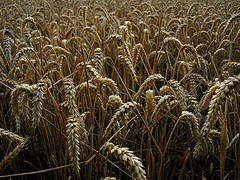Some of the ideas in Paolo Bacigalupi’s excellent Nebula-winning debut novel The Windup Girl are already alarmingly close to reality. In a future world where all the oil is long gone, all energy has to come from food as processed by animals, human or otherwise; when your food crops start dying, it’s a race against time to cook up new genetic variants that can resist the rapid mutations of virulent viruses and parasites… which means big money for whoever has a patent on the right genetic sequences, and perpetual debt (or intellectual property piracy) for everyone else.
A speculative future, certainly, and one that I’m pretty sure isn’t meant to be taken quite as literally as some reviewers and critics have done thus far… but there’s a definite undercurrent of classic science fictional “if this goes on…” in The Windup Girl, and things are going on. Just the other week we mentioned that poppy blight in Afghanistan. Now, via Paul McAuley, we hear that South Africa has been invaded by a new wheat fungus which could easily spread into south Asia and the Middle East, and from there onwards…
“Eventually it will reach North America and Europe,” says Ronnie Coffman, a plant-breeding scientist at Cornell University in Ithaca, New York. He warns that in the next few years, farmers across the world will need to replace up to 90% of the current wheat varieties with new, resistant varieties to ensure crops are protected against the fungus.
That sound you can hear? Monsanto’s board of directors rubbing their fat hands together in delight.
I’m of the opinion that the “Frankenstein foods” panic about GM crops is reactionary foolishness, and that we badly need engineered crops to support the world’s population… but I have serious concerns about incumbent intellectual property laws, not to mention the sort of genetic tampering (e.g. neutered seedstock – it’ll grow, but you can’t grow more without paying up for more viable seeds) that could turn that urgent need into a captive-market profit margin that’ll make the fossil fuel multinationals look like corner-store philanthropists.
That’s very much a worst-case scenario, of course, but forewarned is fore-armed… and Bacigalupi’s novel (which I really must get round to writing a full review of when my schedule allows) is a timely allegory, as well as a very gripping read. Go buy a copy.

 Over at The Guardian,
Over at The Guardian,